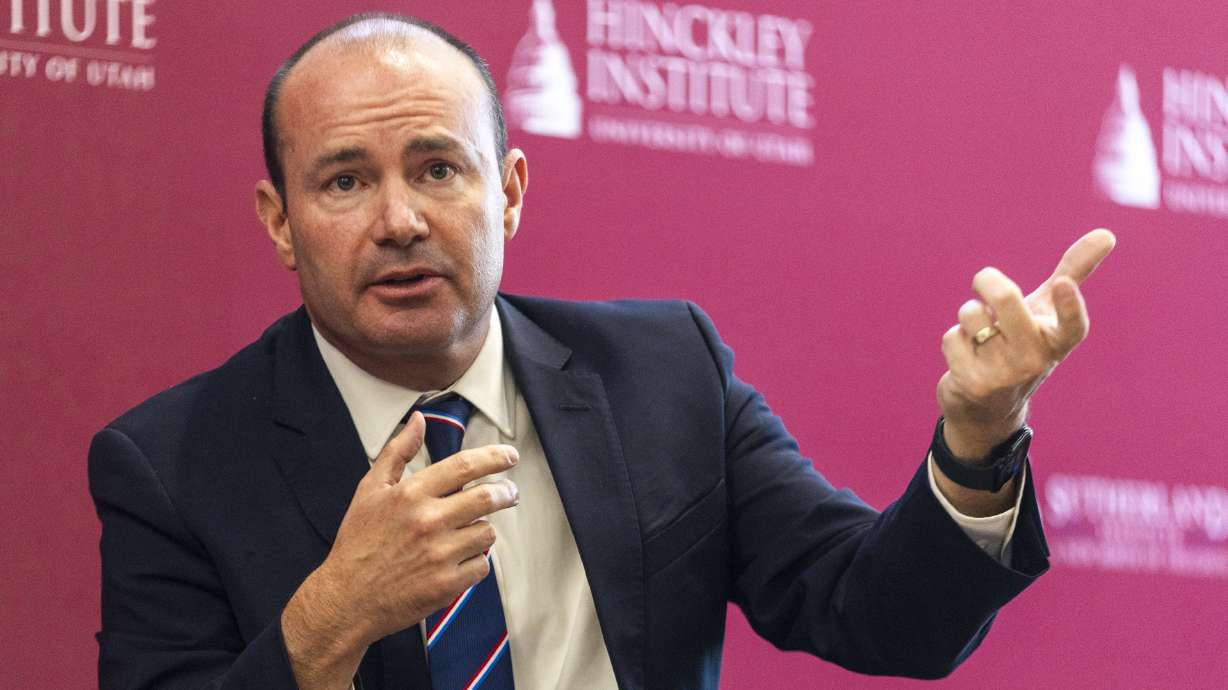Estimated read time: 4-5 minutes
This archived news story is available only for your personal, non-commercial use. Information in the story may be outdated or superseded by additional information. Reading or replaying the story in its archived form does not constitute a republication of the story.
- Utah Sen. Mike Lee has outlined a series of procedural reforms he wants the next Senate GOP leader to adopt.
- He emphasized the need for more opportunities to offer amendments to bills and extended deliberation time before voting.
- Lee addressed his proposed changes during a speech at the University of Utah Monday, during which he called for more congressional oversight of federal rules and regulations.
SALT LAKE CITY — With longtime Senate Republican leader Mitch McConnell set to step down from his leadership seat next month, Utah Sen. Mike Lee has outlined a series of procedural reforms he would like to see the next GOP caucus leader sign on to.
McConnell is the longest-serving Senate leader in history, and Lee said picking a new leader for the first time in 18 years is a "once-in-a-generation opportunity" in a letter to his Republican colleagues last week. The letter describes several reforms he would like to see, including more opportunities to offer amendments to bills and longer time to debate and deliberate before being asked to vote for or against legislation.
While speaking at the University of Utah's Hinckley Institute of Politics on Monday, Lee said the process has evolved to consolidate power with the four leaders in the House and Senate, which he has derisively dubbed "The Firm" of Senate Majority Leader Chuck Schumer, Senate Minority Leader Mitch McConnell, House Speaker Mike Johnson and House Minority Leader Hakeem Jeffries.
Although senators are independently elected and share equal lawmaking power, Lee said the Senate majority leader retains the unique "right of first recognition" to speak on any issue, which he said is often used to prevent senators from offering individual amendments to bills negotiated by leadership.
"The four of them will decide, more or less, on major, must-pass legislation," he said, meaning that "nobody can make any amendments even if you discover that there's some really ugly special interest giveaways in there or even a clerical mistake — it's almost impossible to amend."
He said consolidation of power with the leadership of both chambers of Congress has reached a point recently "where a lot of members of both houses think that they work for their respective party leader in their respective chamber, and that's kind of dangerous. I think the founders would have been uncomfortable with that."
To remedy the issue, Lee proposes that a three-fourths vote from all members be required to block further amendments to bills.
"We need to look for a leader who's willing to use the filling of the amendment tree much more sparingly," Lee said Monday, referring to the procedure by which Senate leaders block amendments. "If either party did that, we would have a much more even distribution of power."
Lee's letter also asks for more time to debate bills and calls on the next Republican leader to propose a calendar at the beginning of each year for negotiating major spending bills that are renewed annually.
"We all know the pressure that comes with last-minute votes on massive spending bills that are dropped on our desks hours before a deadline," he wrote. "This is not how the Senate should operate."
Lee has previously complained that Senate leadership doesn't give adequate time for senators to review the sometimes thousands of pages of policy included in such omnibus spending bills and asked to ensure at least four weeks to review and consider them.
"We know when the funding deadlines are; we set them," he wrote. "We should have no problem setting a schedule for consideration four weeks in advance of that deadline. Providing this time will allow us to craft better laws and give the American people a real opportunity to engage in the legislative process."
During his 40-minute conversation Monday, Lee reiterated much of what he said during a similar forum last August, when he said Congress needs to do more to take back power it has delegated to the executive branch. He called on lawmakers to pass the Regulations from the Executive in Need of Scrutiny (REINS) Act, which would require Congress to approve major rules or regulations created by federal agencies.
Passage of the bill would not be a silver bullet, he said, but would make decisions made by "unelected, unaccountable, nameless, faceless bureaucrats" more accountable to voters.
"I don't think it would happen overnight," he said. "I don't think it would be dramatic, but I think some of that would happen because if all of a sudden Congress has to start voting on all these things, I think there would be a renewed discussion. Do we really need to be exercising federal authority over every aspect of this?" Lee said. "Maybe some of that would end up going back to the states."









